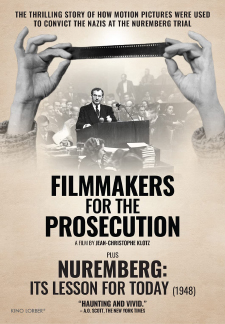Filmmakers for the Prosecution/Nuremberg: Its Lesson for Today (DVD Review)

Director
Jean-Christophe Klotz & Stuart SchulbergRelease Date(s)
2021/1948 (June 13, 2023)Studio(s)
Schulberg Productions/Arte Zadig/KG Productions (Kino Lorber)- Film/Program Grade: B-
- Video Grade: A-
- Audio Grade: A-
- Extras Grade: B
Review
Separated by more than 70 years yet linked to one another, two documentaries—Filmmakers for the Prosecution (2021) and Nuremberg: Its Lesson for Today (1948)—tell inherently compelling, shocking stories still very relevant today.
Filmmakers for the Prosecution, just over 60 minutes, looks back at the efforts of brothers Budd and Stuart Schulberg in the busy months following the end of World War II. They are tasked by OSS head “Wild Bill” Donovan and the head of the OSS’s film unit, director John Ford, to locate self-incriminating, German-made film footage to be presented at the Nuremberg war crimes trials, footage of the accused Nazi leadership expressing their fascist ambitions including purging the Jews from Europe, as well as gruesome footage shot by German cameramen of their horrific results, most particularly ghastly footage taken at Nazi concentration camps.
Directed by Jean-Christophe Klotz, Filmmakers for the Prosecution is riveting if oddly structured. The first part of the film focuses on correspondence between Stuart Schulberg and his young wife, but then shifts primarily to video of elderly brother Budd discussing their efforts. The film then shifts gears again, providing a Cliff Notes summary of the Nuremberg trials, paying particular attention to the placement of cameras documenting that unprecedented event. The documentary then concludes with a discussion of Nuremberg: Its Lesson for Today (1948), a feature-length film Stuart prepared that was shown in (West) Germany but unreleased in the United States for the same Cold War era political reasons later pointedly criticized in Abby Mann’s television play (and Stanley Kramer’s movie of) Judgment at Nuremberg.
It’s always interesting but the structuring of material is a little discombobulating and works against its effectiveness as it leaves the film without much of a narrative sweep. Indeed, we never learn what happened to Stuart Schulberg after the war, or his reaction to his film being suppressed by the very government that commissioned it.
Indeed, one story about the trials is so incredible that it’s disappointing that director Klotz tells it so clumsily. After several attempts to raid German film vaults only to find that, each time, they arrived too late—Germans had beat them to it, leaving only ashes behind, Schulberg learned about a German vault in the Russian Zone, everyone certain the Soviets would never, ever allow him access. However, when the Russian major in charge of the vault learned that Schulberg’s boss was John Ford, the Russian became ecstatic—he was a huge John Ford fan that knew every shot from Young Mr. Lincoln and gave Schulberg unlimited access!
The second feature, Nuremberg: Its Lesson for Today, is rather curious. Running 79 minutes, it was initially targeted at German audiences, so its title cards and other text are in German, and an English narration track was either never recorded or lost over time. Instead, actor Liev Schreiber narrates, though the audio for his narration is almost too good; it doesn’t really match the images, even though it appears he’s reading from the original script or maybe a direct translation of the German one, written in a narrative style slightly anachronistic today.
Another curiosity, more of a major complaint, is that a watermark in the lower right-hand corner of the frame is plainly visible throughout the film and, at times, is highly distracting. One expects such things in online videos but anyone ponying up the money to buy the DVD shouldn’t have to contend with such a thing. In my 25 years of watching and reviewing DVDs and Blu-rays, I’ve only encountered this on commercial copies a couple of times, and it always and deservedly gets complaints.
The film itself is rather straightforward, a chronological, methodical summary of the trial. As detailed in Filmmakers for the Prosecution, the documentarians had limited access to the trial with limited angles to shoot from, so many shots are fudged: at times we’re shown someone speaking but their words on the soundtrack in no way match their lip movements, with audio and visual elements produced months apart in some cases.
But, as both films point out, the lessons of Nuremberg are both prescient and must not be forgotten. As Robert H. Jackson, Chief of Counsel of the United States, stated in his opening remarks:
“What makes this inquest significant is that these prisoners represent sinister influences that will lurk in the world long after their bodies have returned to dust. We will show them to be living symbols of racial hatreds, of terrorism and violence, and of the arrogance and cruelty of power. They are symbols of fierce nationalisms and of militarism, of intrigue and war-making which have embroiled Europe generation after generation, crushing its manhood, destroying its homes, and impoverishing its life. They have so identified themselves with the philosophies they conceived and with the forces they directed that any tenderness to them is a victory and an encouragement to all the evils which are attached to their names. Civilization can afford no compromise with the social forces which would gain renewed strength if we deal ambiguously or indecisively with the men in whom those forces now precariously survive.”
Collected on one Region-Free disc, Filmmakers or the Prosecution is presented in 16:9 enhanced 1.66:1 widescreen, while Nuremberg is 1.37:1 full frame. Both films are accompanied by English subtitles for the German, Russian, and French dialogue, and both are listed as 2.0 Dolby Stereo.
Extras are a PDF/DVD-ROM only booklet, trailers, and additional interviews with Michael Berebaum, Benjamin Ferencz, Annette Insdorf, and Stuart Liebman.
Not quite as wonderful as I had hoped but still very much worthwhile, this double-feature set is Recommended.
- Stuart Galbraith IV

